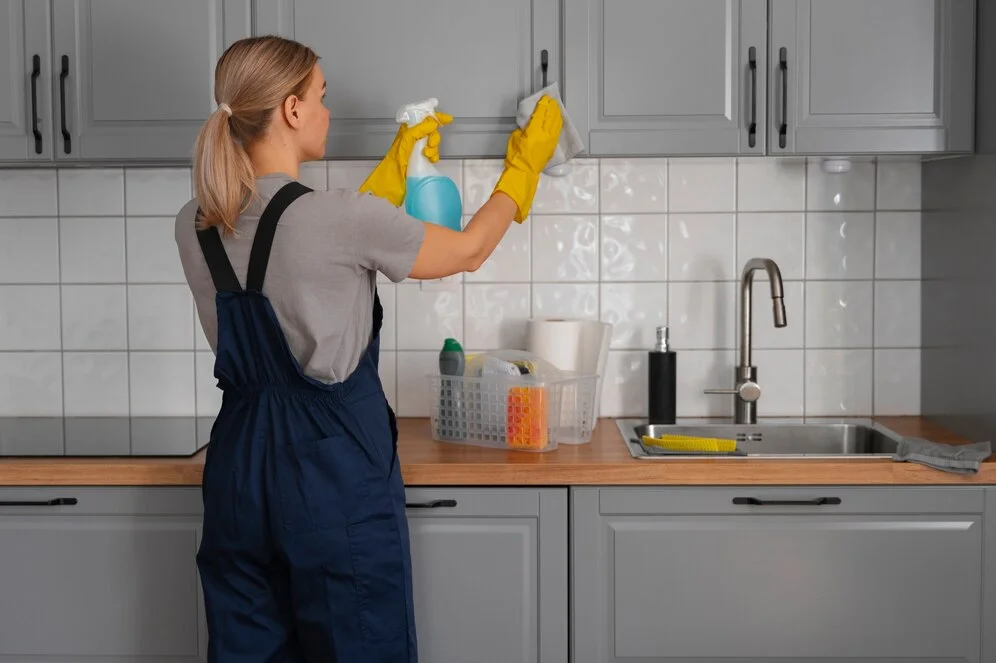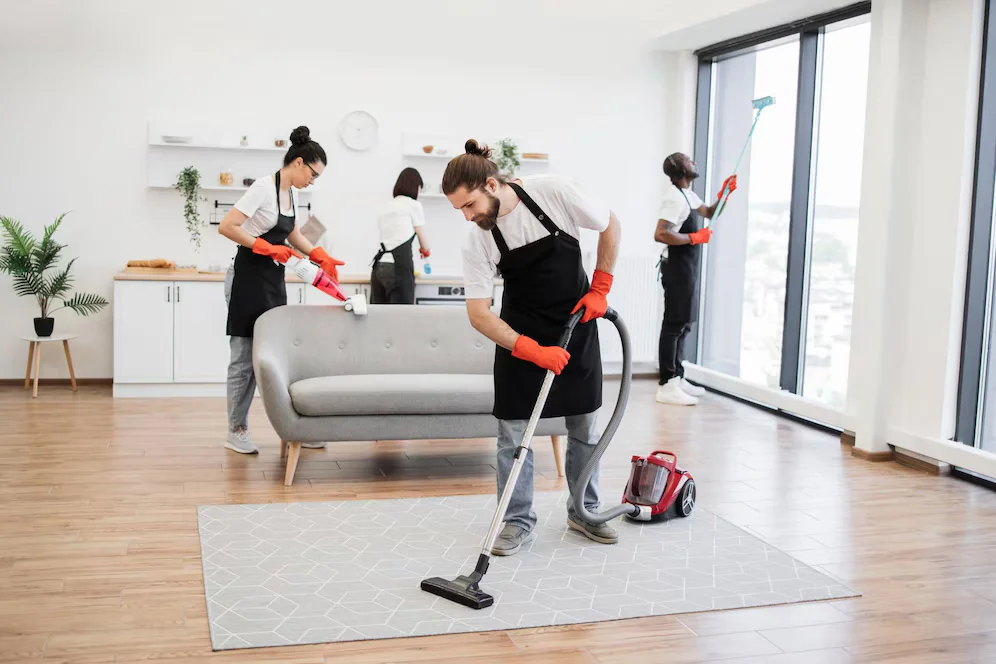-
Motilal Colony , Dumdum, Kolkata 700079
Top 5 Mistakes to Avoid While Deep Cleaning Your Home
Home | Blogs | Top 5 Mistakes to Avoid While Deep Cleaning Your Home

By Royals
April 26, 2025
Top 5 Mistakes to Avoid While Deep Cleaning Your Home
Deep Cleaning Your Home? Learn the top 5 mistakes to avoid for a cleaner, healthier space from experts who understand how your home’s safety and hygiene go hand in hand.
Deep cleaning your home can feel like a fresh start—removing dirt, decluttering spaces, and giving your environment new life. But what if your best intentions are actually doing more harm than good?
Many people unknowingly make common mistakes during the deep cleaning process that not only reduce the effectiveness of their efforts but can also damage belongings or compromise the overall hygiene of their space.
Table of Contents
Let’s walk through the five biggest mistakes to avoid while deep cleaning your home and how small tweaks in your method can lead to massive results.

Why Deep Cleaning Matters More Than Ever
In today’s world, home cleanliness isn’t just about appearances—it’s closely tied to health, mental well-being, and even security. While most people associate safety with locks and surveillance systems (which are important), maintaining a clean and organized home also helps prevent pests, mold, and other health hazards. In fact, many security professionals advise clients to keep their spaces hygienic and clutter-free, as neglected areas can become potential entry points or hiding spots for intruders.
Mistake 1 – Skipping the Decluttering Phase
Why It Matters
Before you even start scrubbing, vacuuming, or spraying, the first step in deep cleaning your home should be decluttering. Removing unnecessary items not only makes cleaning easier but also reveals hidden spots that often get overlooked.
How to Avoid It
- Sort items into “keep,” “donate,” and “discard” categories
- Start with high-traffic areas like the kitchen, entryway, or bedroom
- Use baskets or boxes to organize items during the process
- Never clean around clutter—that’s surface-level at best
By eliminating excess before cleaning, your efforts become far more effective and efficient.
Mistake 2 – Using Harsh Chemicals Everywhere
Why It Matters
Not all surfaces are created equal, and neither are cleaning solutions. Using the wrong chemical on hardwood, marble, or even metal can cause irreversible damage.
How to Avoid It
- Always check the manufacturer’s guidelines for surfaces
- Use pH-balanced cleaners for delicate areas like granite or marble
- For eco-conscious cleaning, consider natural alternatives like:
- Baking soda + vinegar for bathroom tiles
- Lemon juice for grease
- Steam cleaning for fabrics
Remember: Deep cleaning your home shouldn’t come at the cost of destroying it.
Mistake 3 – Ignoring Hidden Zones
Why It Matters
When we think of cleaning, we usually focus on visible areas. But mold, dust mites, and bacteria love to hide in less obvious places.
Commonly Missed Spots
- Behind the refrigerator
- Inside air conditioning vents
- Under furniture and rugs
- Tops of ceiling fans and curtain rods
- Inside trash bins and under sink cabinets
How to Avoid It
- Use a checklist or app to track which areas have been cleaned
- Schedule different zones per day if you can’t tackle it all at once
- Invest in extension tools or vacuum accessories for hard-to-reach places
By deep cleaning hidden areas, you’re not just tidying up—you’re actively improving air quality and hygiene.
Mistake 4 – Poor Time Management
Why It Matters
Trying to deep clean your entire home in one day is a recipe for burnout. It also leads to rushed jobs, missed spots, and sloppy work.
How to Avoid It
- Break your home into zones (kitchen, bathroom, living room, etc.)
- Create a realistic timeline based on your availability
- Prioritize problem areas or high-use zones first
- Use timers or playlists to pace yourself (e.g., 30-minute clean bursts)
When you take your time, you avoid shortcuts—which is what deep cleaning is all about.
Mistake 5 – Not Focusing on Safety During Cleaning
Why It Matters
Ironically, cleaning can expose you to health hazards if not done safely. Overexposure to chemicals, slippery floors, or electrical appliances can lead to injury.
Safety Tips During Deep Cleaning
- Wear gloves and masks when using strong products
- Open windows for ventilation
- Keep kids and pets away from freshly cleaned surfaces
- Avoid mixing chemicals (e.g., bleach + ammonia = toxic gas)
- Use proper posture when lifting or moving furniture
You’d be surprised how many professional cleaning services collaborate with security and home safety consultants to ensure a holistic, accident-free environment, especially in urban and high-density residential areas where maintaining a safe, hygienic home is increasingly essential.
Subtle Signs You’ve Missed the Mark While Deep Cleaning Your Home
Sometimes, it’s not obvious that your cleaning session didn’t go as planned. Here are a few signs:
- Lingering odors even after cleaning
- Sticky or filmy surfaces
- Return of dust within hours
- Stains that become worse after cleaning
- New allergic reactions post-cleaning
If these signs show up, it might be time to reassess your techniques or consult professionals who understand both hygiene and household safety.

FAQs About Deep Cleaning Your Home
1. How often should I deep clean my home?
Ideally, every 3–6 months. However, high-use zones like kitchens and bathrooms benefit from monthly deep cleaning.
2. Can I use DIY methods for everything?
DIY cleaning hacks are great but limited. Tough stains, upholstery, or HVAC systems might require professional help.
3. Is deep cleaning different from regular cleaning?
Yes. Regular cleaning maintains cleanliness; deep cleaning removes deep grime, allergens, and bacteria from often-ignored areas.
4. Should I hire a professional cleaner?
If you’re short on time, have specific needs (like pest prevention or post-renovation cleanup), or want to ensure hygiene at a higher level, professional services are worth it.
5. How does home hygiene relate to overall safety?
A well-maintained home is less prone to pest invasions, mold growth, and even break-ins—clean, uncluttered spaces are easier to monitor and secure.
Clean Smart, Not Hard
Deep cleaning your home is not just a weekend chore—it’s a form of self-care and a proactive step toward a healthier lifestyle. Avoiding the five key mistakes listed above can save you time, protect your belongings, and ensure long-lasting results.
In modern living environments, cleanliness and security are more interconnected than most people realize. A well-maintained home not only promotes better health but also reduces potential safety risks like pest infestations, fire hazards, or unauthorized access through neglected areas. Many reputable home and security service providers now emphasize the importance of regular deep cleaning as part of a broader approach to residential safety and overall well-being.
Remember: clean homes aren’t just beautiful—they’re functional, stress-free, and secure.



